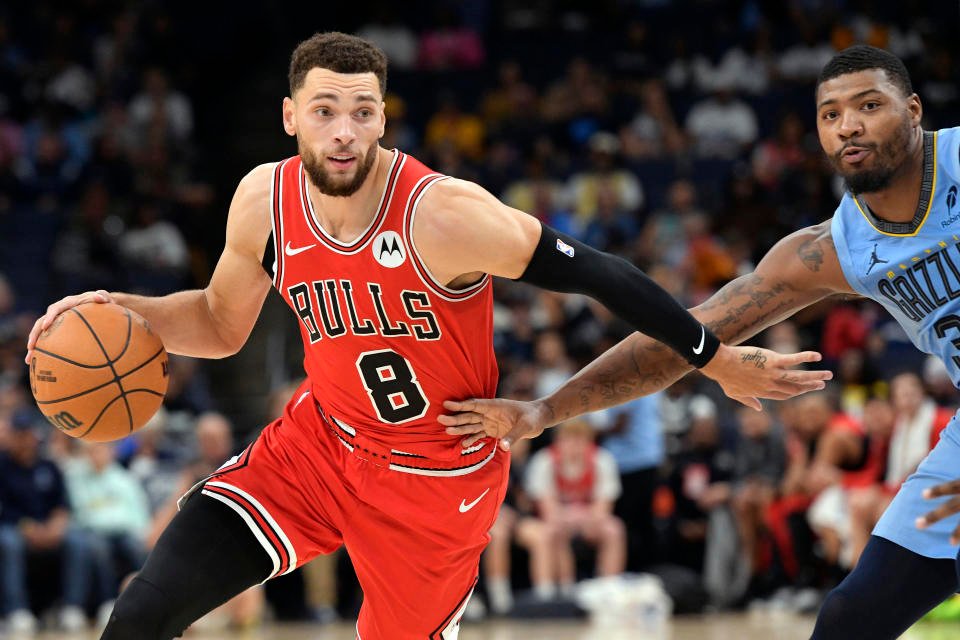After years of depressed sighs, and unheard calls from a fan base yearning for ingenuity, the Chicago Bulls have — surprisingly — answered the call to step into the 21st century and embraced the 3-point shot.
The organization, led by head coach Billy Donovan in his fifth season with the franchise, has long been conservative in its approach to how basketball should be played, just as it has historically been behind the curve when it comes to roster construction.
For now, the Bulls seem to have fixed one of two problems, and for the Bulls, that’s a significant amount considering their reluctance to learn new tricks.
Donovan, for his part, has charged his troops with the responsibility of shooting away from the outside while constantly running the floor, with Chicago now leading the league in rushing after ranking 28th last season.
For fans, it’s a refreshing change from the perspective of entertainment. Who doesn’t love a fast-paced offense that includes a ton of 3s?
Zach LaVine, who spent the last year listening to talking heads proclaim that he’s nothing but a bad contract, has embraced an off-ball role and is reminding teams that he’s actually still very capable of giving anyone 25 when he wants to.
The 29-year-old fully bought into the new schemes, averaging 22.7 points on 49.5/45.8/81.5 shooting splits. Partly because this was always the system in which he was destined to thrive, and it could also buy him an exit strategy.
(Don’t worry. We’ll get there.)
It’s refreshing to see a former All-Star reclaim his own story, especially after an injury-plagued year when he was limited to just 25 games.
Of course, it’s not just LaVine. Coby White takes 9.3 triples per game and four other Bulls take more than four.
Even Josh Giddey, a known non-shooter, is currently hitting 47.6% of his 3s. While that level of performance certainly isn’t sustainable, it’s a step in the right direction for a player Thunder head coach Mark Daigneault couldn’t justify keeping on the floor during last season’s playoffs due in large part to his firings.
So yes. Kumbaya and all that good stuff. The Bulls are fun, and they finally have a shooting profile that resembles other professional basketball teams. amazing
This is where things get difficult.
With a 3-3 record, you have to wonder what exactly they hope to accomplish this season.
In a year when the upcoming draft class looks like one of the deepest in years, and with the Bulls owing their 2025 first-round pick to San Antonio if they fall outside the top 10, it’s curious that Chicago has now chosen to become important.
There is no superstar on the roster. There might not even be an All-Star this year. Moxie and grit, while commendable, do not make a champion.
It would seem particularly optimistic for the Bulls to lean toward a potentially winning formula now, only to give up their 2025 pick and a shot at Duke uber-prospect Cooper Flagg.
And with the CBA’s 140% extension limit, Chicago is in a less than ideal position regarding White and Ayo Dosunmu. When both become open to extensions next summer, the Bulls are limited in what they can offer them, meaning both will eventually hit the open market in 2026 to secure new deals.
As for LaVine, if he stays healthy and productive, interest in him should increase, especially as contenders start charging at the trade deadline.
If a competitive team needs an offensive push heading into the playoffs and can make the salaries work, LaVine would be a perfectly fine solution with the receiving team likely to give up less value than it takes.
There’s also the matter of Giddey, who is reportedly looking for a new deal that would compensate him at $30 million annually, which is quite the price for a player no one really knows is a full-time starter.
Basically, the Bulls have a lot of challenges ahead of them, some of which could – and should – lead directly to a full rebuild.
Of course, this would mean the loss of Donovan, who is not interested in such an adventure. Team president Artūras Karnišovas, who has traded away picks like sweets since taking over in 2020, is of a similar mindset.
This situation and new playstyle all raise the same question:
What exactly is the plan?
If the Bulls take it strong this season, it’s more than likely they’ll end up in the playoffs again. If they get lucky, and get through, would anyone really expect them to get past Boston, New York, Orlando, Cleveland, Milwaukee or even Philadelphia, assuming Joel Embiid ever plays again?
Sure, it would keep the fans happy for a few weeks, until the night of the draft lottery when they remember their pick is going to San Antonio. You know, the team that drafted that tall French guy who is pretty good.
Look, it’s okay to cash in your chips and go for it. Many teams have, and for some it has resulted in actual championships. But those teams had an established baseline of elite talent, which the Bulls don’t, making any attempt at relevancy they’re going through now … weird.
That’s not to say the Bulls aren’t absolutely doing the right thing about installing an offense that doesn’t give us flashbacks to the 1980s. Making the right judgment calls will always be a good thing, especially after years of not doing it.
But time sucks, and only adds confusion to a fan base that hasn’t known what’s up or down for about half a decade.
So, should the Bulls be praised for their adjustments, blamed for their lack of planning or should they be pressured to give the fans a real look behind the curtain so people know what’s really going on?
Yes, to everyone. Nuance is overwhelmingly needed here.
But whatever the Bulls decide, history reminds us that this is an organization that doesn’t make things easy for anyone.


